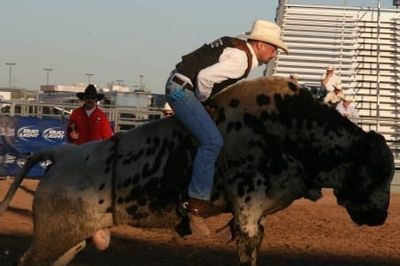Although we are in Music City, those cowboys haven’t wandered in on their way downtown to the honky-tonks on Broadway. They are members of the Smokey Mountain Rodeo Association (SMRA) trying to raise money and awareness for a number of charitable organizations.
The SMRA is a member association of the International Gay Rodeo Association (IGRA). Gay rodeo first got its start back in Reno, Nev., in 1975 when a group in Reno’s gay community decided to hold a rodeo as a fundraising idea to support the Muscular Dystrophy Association.
By the early 1980s, gay rodeo associations and events were formed in Colorado, Texas, Nevada, Arizona, Oklahoma and California. In 1985, the IGRA was formed, and today it currently has member associations representing several states, the District of Columbia and two Canadian provinces. SMRA officially became the IGRA’s 24th member association in July 2003.
While thoughts of gay cowboys might conjure images from "Brokeback Mountain," the SMRA hopes to be equally associated with social networking and charity work.
For more information, |
SMRA President Michael Fierro said the group exists to promote the education and enjoyment of the Western lifestyle while also committing to raise funds for charitable organizations within the community.
“Since its inception, SMRA has raised and distributed more than $35,000 for organizations that care for and seek cures for those living with HIV/AIDS, as well as those for children's services, animal welfare and others that focus on social issues within our society as a whole,” Fierro said. For 2010, Fierro says their charities include Angel Heart Farm and the Louisville AIDS Walk.
In addition to their charity work, SMRA members compete in many of the gay rodeo events held around the country each year. Fierro said gay rodeos are very similar to straight rodeos; and the men and women participating are real cowboys and cowgirls. Events include the traditional rodeo events of cow roping, barrel racing and bull riding. However, there are a few differences.
“One indication it’s a gay rodeo would be the 'goat dressing', which is strictly a gay-rodeo event," Fierro said. "It involves putting men’s underwear on the hind legs of a goat.”
Another unique gay-rodeo event is 'wild drag,' which involves a team of three people, one dressed in drag, along with two others all working together to get the one in drag on the back of a steer and across a predetermined line in the arena.
Then, there's 'steer decorating' where two team members put a red ribbon on a steer’s horns, and the use of breakaway roping, meaning that any time a steer or calf is roped the end of the rope “breaks away” from the saddle or hand of the contestant, unlike straight rodeos where the lasso stays attached to the saddle.
One of SMRA’s own cowboys, Chad Billings, also known as “Smurf,” was a big winner at the Arizona Gay Rodeo Association’s Road Runner Regional Rodeo (RRRR) this past January. Smurf took his chances riding a spotted black and white bull named “Mud," and won a championship buckle by being the only cowboy to cover his ride.
As they continue traveling to other rodeo events and executing their fundraising efforts, Fierro said the group also has its sights set on a bigger goal.
“We are currently planning a rodeo, tentatively for September 2011," he said. "We are very excited about hosting a gay rodeo in the Tennessee area and getting our local GLBT community involved in this preparation. It will be very exciting to have fellow competitors from the United States and Canada come to experience Music City, U.S.A.”
In addition, Fierro said they will continue to be a social organization, hosting rodeo night at bars, dances, cookouts, car washes and yard sales.
“SMRA currently has 78 members from all over our regional area of Tennessee and Kentucky," he said. "We have all kinds of people that belong to this organization, from cowboys to businessmen. SMRA is not solely about rodeo, we are also a social organization that enjoys getting together at local bars in Nashville, Louisville, Knoxville, Chattanooga, Lexington and Paducah, among others.”
